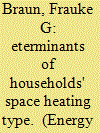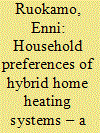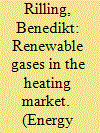|
|
|
Sort Order |
|
|
|
Items / Page
|
|
|
|
|
|
|
| Srl | Item |
| 1 |
ID:
098565


|
|
|
|
|
| Publication |
2010.
|
| Summary/Abstract |
Considering the increasing attention on efficient use of energy, it becomes vitally important to understand the energy-related behavior of households. This article presents empirical evidence on the determinants of the space heating technology applied by a household. Three sets of variables are examined as potential influences-building, socio-economic, and regional characteristics. To highlight both the differences and similarities, the results are obtained from a sample of house owners, and from a sample including all households. The influence of socio-economic factors is similar across these groups. Income is found to exert only a minor impact on the system choice. Dwelling features are significant in determining the heating type, particularly in the sample including all households. Regional effects are important-clear differences prevail between East and West Germany.
|
|
|
|
|
|
|
|
|
|
|
|
|
|
|
|
| 2 |
ID:
150644


|
|
|
|
|
| Summary/Abstract |
The German Energiewende envisages achieving a climate-neutral building stock in 2050 by means of two major pillars of regulation. First, residential buildings should consume 80% less primary energy and second; the remaining energy demand should be covered primarily with renewables. This paper simulates the future German heating market under different policy scenarios in order to evaluate the impact and limits of recent and conceivable policies. The investigation is based upon a dual model approach, linking a residential heating model to a discrete choice model. The major finding is that current regulations are not suitable for the achievement of governmental targets. Scenario calculations show that additional carbon emission reductions, triggered by the current regulatory regime, are falling short of expectations. In terms of economic efficiency, all calculated policy alternatives outperform the regulation currently in place. This allows to draw the conclusion that carbon emission reductions can be achieved without a major increase in cost. The model results highlight two policy implications. First, a rising mandatory share of renewables in the heating market is needed for target achievement and can be cost effectively. Second, renewable obligations for heating systems must include the existing building stock to achieve the postulated political targets.
|
|
|
|
|
|
|
|
|
|
|
|
|
|
|
|
| 3 |
ID:
150738


|
|
|
|
|
| Summary/Abstract |
The residential heating sector presents considerable energy savings potential, as numerous heating solutions for reducing electricity consumption and utilizing renewable energy sources are available in the market. The aim of this paper is to examine determinants of household heating system choices and to use this information for policy planning purposes. This paper investigates residential homeowner attitudes regarding innovative hybrid home heating systems (HHHS) with choice experiment. Heating system scenarios are designed to represent the most relevant primary and supplementary heating alternatives currently available in Finland. The choice sets include six main heating alternatives (district heat, solid wood, wood pellet, electric storage heating, ground heat pump and exhaust air heat pump) that are described by five attributes (supplementary heating systems, investment costs, operating costs, comfort of use and environmental friendliness). The results imply that HHHSs generally appear to be accepted among households; however, several factors affect perceptions of these technologies. The results reveal differing household attitudes toward the main heating alternatives and show that such views are affected by socio-demographic characteristics (age, living environment, education, etc.). The results suggest that households view supplementary heating systems (especially solar-based) favorably. The other attributes studied also play a significant role in decision making.
|
|
|
|
|
|
|
|
|
|
|
|
|
|
|
|
| 4 |
ID:
192717


|
|
|
|
|
| Summary/Abstract |
Renewable gases like biomethane or Synthetic Natural Gas (SNG) can play an important role in short-to mid-term decarbonization of the residential heating sector. By (partially) replacing the dominant natural gas, they accomplish two major goals: lowering CO2 emissions and lessening import dependencies. While existing research points to great production potential and technical options for producing renewable gases, the demand side has largely been neglected. Yet consumer decision making is highly relevant for climate change mitigation. Against this backdrop, we conducted a Discrete Choice Experiment with 512 heating consumers in Germany, a country with a high dependency on natural gas. We decomposed the gas tariff into six attributes (share of renewable gas, labels, regionality, biomethane feedstock, supplier type, and price) with varying attribute levels.
|
|
|
|
|
|
|
|
|
|
|
|
|
|
|
|
|
|
|
|
|